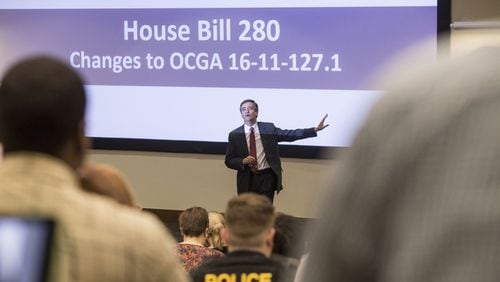After years of political debate, partisan pleas and protests, Georgia as of Saturday will allow guns on any campus in the state's public college and university system.
The “campus carry” legislation is the most high-profile of a slew of laws that become effective July 1. including an expansion of Georgia’s medical marijuana law and permission for the state to take over failing schools.
Campus administrators and law enforcement officials have spent weeks holding town hall-style meetings. Facts sheets have gone out to digital in-boxes. Officials with the University System of Georgia, which has 45,000 employees, have posted online information and guidance about the new law.
Yet a number of faculty and students say they are still confused about what to expect, in part because guns are allowed on some parts of the campuses and prohibited in other areas. Some worry their campus communities aren’t prepared, an unease heightened by a schedule that brings an influx of hundreds of thousands of people mid-August when the fall semester begins.
“I think the university is being responsive but I just don’t think there will be a clear answer for a while,” said Victoria Smith-Butler, a communications professor at Albany State University and chairwoman of the University System’s faculty advisory council.
Smith-Butler said she is trying to be realistic.
“I’m sure there have been students with guns in my classroom before without me knowing it,” she said. But now that it will be legal, “we are not sure how to deal with it. We’re breaking new ground.”
According to system officials, the law leaves it up to the person carrying the gun to know what the rules are and to follow them. That includes whether they are entering a place on campus where guns are still banned or if they are taking a class with a high school student — a situation that would also bar them from carrying their weapon.
Under the law, anyone with a concealed-weapon permit will be allowed carry firearms on all public college and university campuses, with exceptions that include dormitories, fraternity and sorority houses, and buildings used for athletic events. On-campus child care centers are also excluded, as are areas on campus where high school students attend class.
No signs will be posted on campus identifying which areas are off-limits. Everyone has been told they are not allowed to ask whether someone is legally carrying a gun.
This was the fifth year in a row the Legislature had considered such a measure. Last year’s legislation got as far as Gov. Nathan Deal’s desk before he vetoed it, citing concerns that it was both too broad and that campuses have historically been gun-free to promote learning.
He signed House Bill 280 this year, however, after supporters agreed to other concessions that additionally excluded guns from places such as campus discipline hearings and administrative and faculty offices. With it, Georgia became one of at least 34 states to allow guns on public college campuses.
Supporters have said the law gives faculty and students a chance to protect themselves without interfering with their peers, since weapons must be concealed. It is an added measure, they say, to counter criminals who may also bring a gun onto campus.
Critics, however, fear allowing guns on campus creates an unsafe environment. They’ve cited national studies, including one released last fall by the Johns Hopkins University Bloomberg School of Public Health that concluded the presence of guns would likely lead to more shootings, killings and suicides on campus, especially among students.
Georgia law requires anyone seeking a state permit to carry a concealed gun to be at least 21 years old. They must be fingerprinted and pass a background check.
Younger out-of-state students, however, could be allowed to carry their weapon here depending on “reciprocity” agreements that Georgia has with other states. In those agreements states recognize one another’s gun laws, so students from places such as Missouri, where the minimum age for a concealed-carry permit is 19, could also legally carry on campus in Georgia.
Other potential issues include the conundrum of game day: People will be allowed to carry their weapons in tailgating areas where alcohol can be consumed, but not inside athletic facilities.
Then there is the question of what to do with their firearms when owners are not carrying them if, for example, they live on campus. No campus in Georgia will provide gun storage facilities. Existing state law allows weapons to be locked in cars if the permit holder comes onto campus.
Students who supported the legislation said they will ask the Legislature next year to add provisions that allow weapon holders to keep their firearms in their dorm rooms.
“It’s a real pain for anyone I know who carries,” said Ja’Quan Taylor, 21, a Georgia Tech senior who lives off-campus.
Guns are supposed to be concealed, carried in a fashion that does not attract attention. Campus police will be responsible for administering the law.
For students like Taylor, who said the law gives him and others an assurance of protecting themselves, Saturday will be a momentous occasion. Taylor has carried his primary weapon — a .45 ACP handgun — near Georgia Tech but not on the campus. Now everything will change.
“It’s definitely going to feel safer,” he said.
Some faculty members, too, have praised the plan. When the faculty Senate at Darton State College — which has since merged with Albany State — voted on the issue before final passage, half thought it was a good idea.
Smith-Butler, who has a law degree from Emory University, said her biggest concern is what she considers inconsistencies in what the law addresses and ignores. Smith-Butler said while she personally opposes guns on campus, her peers “just want more direction and consistency.”
It’s too soon to know whether the law will have any effect on enrollment, despite threats by some parents to remove their children over the issue. Officials also have no way to say how many people will be carrying guns on campus.
Some are attempting last-ditch efforts to make the rules clearer. Georgia State assistant professor Julia Gaffield started an online petition Wednesday asking the state Board of Regents to require its campuses to post signs where guns aren't allowed.
In the meantime, some students are taking it on themselves to also spread the word. Tech’s Taylor and others recently conducted an online session to talk about the law. They plan more.
Others are still trying wrap their minds around what to expect.
“It’s still really muddy,” said Audrey Smith, 21, a rising senior at the University of Georgia who said there are plans at that campus to conduct gun safety training this fall with campus police and student government leaders. “It still raises a lot of questions for me.”
Dozens of new laws go into effect July 1 in Georgia. Among them:
House Bill 1: Dubbed the "Georgia Space Flight Act," this essentially sets legal rules over liability involving private property and any would-be astronauts, a first for the state. It says that those participants would have to assume the risks for injuries or accidents and sign "informed consent" waivers, except in cases of gross negligence by the company sponsoring the flight. State officials hope it attracts private companies trying to get into the space business, such as a proposal local officials are ready to launch in coastal Camden County.
House Bill 37: Largely symbolic, this law allows the state to withhold public funding from any private college and university in Georgia that declares itself a "sanctuary campus" for undocumented students in defiance of President Donald Trump's immigration policies. Institutions such as Emory University receive tens of millions of state dollars each year for health services and tuition assistance grants. No private institution, however, has such a declaration in place.
House Bill 338: This will give the state broader power to intervene in schools it dubs low-performing. It creates a state-employed "chief turnaround officer" who would lead an intervention in conjunction with local school boards. If those initial efforts fail, the state could resort to removing a school's staff or converting it to a charter school.
House Bill 481: This prevents local governments from passing regulations on top of state law regarding launching and landing drones — essentially handing state officials the reins in how drones are regulated in Georgia.
Senate Bill 16: This expands Georgia's limited medical marijuana law, which starting in 2015 allows registered patients to possess up to 20 ounces of cannabis oil to treat severe forms of eight specific illnesses, including cancer, Parkinson's disease and epilepsy. The new law adds six more conditions eligible for treatment: AIDS, Alzheimer's disease, autism, epidermolysis bullosa, peripheral neuropathy and Tourette's syndrome. It also allows patients in hospice care to possess the oil.
Senate Bill 160: Dubbed the "Back the Badge Act of 2017," it stiffens penalties against people who assault law enforcement officers.
Also of note: Although it passed last year, another new law taking effect July 1 requires public school districts and the state's education department to post information online in a visible location about proposed textbooks and other instructional materials they'd like students to use.








